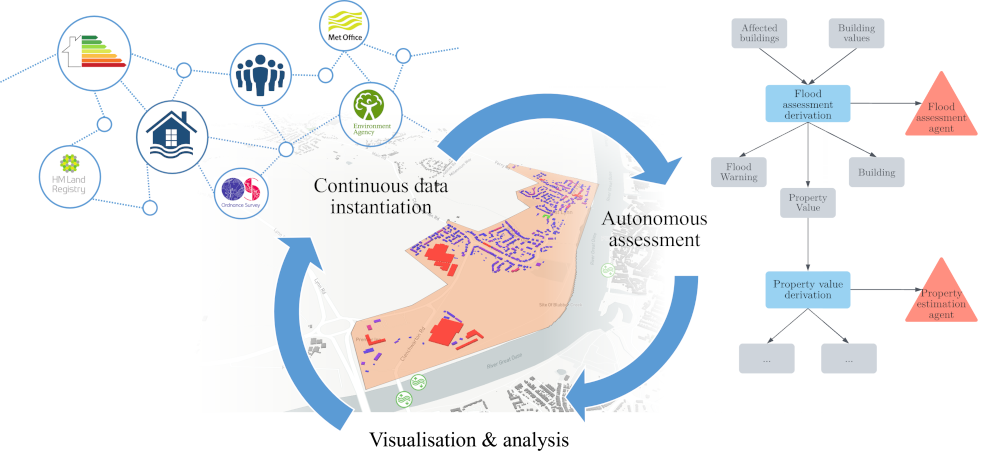Technical Report 309, c4e-Preprint Series, Cambridge
Semantic Agent Framework for Automated Flood Assessment Using Dynamic Knowledge Graphs
Reference: Technical Report 309, c4e-Preprint Series, Cambridge, 2023
- Developed three coupled domain ontologies to instantiate data relevant to flooding.
- Implemented semantic agent framework for autonomous data ingestion and assessment.
- Utilised derived information framework to automatically update dependent information.
- Deployed sequences of connected derivation agents to assess impacts of flood hazards.
 This paper proposes a framework of linked software agents that continuously interact with an underlying knowledge graph to automatically assess impacts of potential flooding events. It builds on the idea of connected digital twins based on the World Avatar dynamic knowledge graph to create a semantically rich asset of data, knowledge, and computational capabilities accessible for humans, applications, and artificial intelligence. We develop three new ontologies to describe and link environmental measurements and their respective reporting stations, flood events and their potential impact on population and built infrastructure as well as the built environment of a city itself. These coupled ontologies can dynamically instantiate near real-time data from multiple fragmented sources into the Base World of the World Avatar. Sequences of autonomous agents based on a previously developed derived information framework automatically assess consequences of newly instantiated data, such as newly raised flood warnings, and cascade respective updates through the graph to ensure up-to-date insights into the number of people and building stock value at risk. Although we showcase the strength of this technology in the context of flooding, our findings suggest that this system-of-systems approach is a promising solution to build holistic digital twins for various other contexts and use cases to support truly interoperable smart cities.
This paper proposes a framework of linked software agents that continuously interact with an underlying knowledge graph to automatically assess impacts of potential flooding events. It builds on the idea of connected digital twins based on the World Avatar dynamic knowledge graph to create a semantically rich asset of data, knowledge, and computational capabilities accessible for humans, applications, and artificial intelligence. We develop three new ontologies to describe and link environmental measurements and their respective reporting stations, flood events and their potential impact on population and built infrastructure as well as the built environment of a city itself. These coupled ontologies can dynamically instantiate near real-time data from multiple fragmented sources into the Base World of the World Avatar. Sequences of autonomous agents based on a previously developed derived information framework automatically assess consequences of newly instantiated data, such as newly raised flood warnings, and cascade respective updates through the graph to ensure up-to-date insights into the number of people and building stock value at risk. Although we showcase the strength of this technology in the context of flooding, our findings suggest that this system-of-systems approach is a promising solution to build holistic digital twins for various other contexts and use cases to support truly interoperable smart cities.
Material from this preprint has been published in Data-Centric Engineering.
PDF (12.0 MB)



